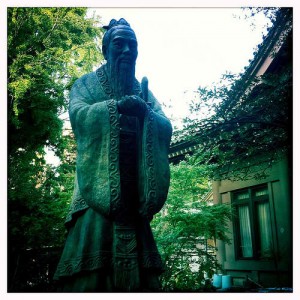Confucianism is a philosophical and ethical system or a way of life taught by Confucius in the 5th-6th century BC. Some see it as philosophy or religion, as an “all-encompassing humanism that neither denies nor slights heaven”.
Confucianism is known to be a combination of ren also known as “benevolence or humaneness” of people within a community. It is a reflection of excellent character in accordance to li or ritual norms, yi or the moral disposition to do good, zhong which is loyalty to one’s nature, shu or reciprocity and xiao filial piety. Altogether they are seen as de or virtue. Confucius also believes that it is necessary to give up one’s life “passively or actively for the sake of upholding cardinal and moral values.
These beliefs are all characteristics of a positive view of human nature and faith that all human beings are gifted and can do wonderful things. They are all capable of improving, being taught and reaching a certain level of perfection through ‘self-cultivation and self-creation’.
Confucius saw heaven or T’ienas a personal universal force and he regarded it as positive. This belief was contrary to what people assumed that he was a skeptic or agnostic who did not believe in a higher power.
Confucianism does not have specific rituals or practices apart from its ‘ethical principles’. Most of these so called practices are a combination of Taosim, Buddhism and Chinese religion.
This way of thinking has a huge following. It has become a moral compass, even influencing political and spiritual life in China. It has even spread out to neighboring Asian countries such as Taiwan, Korea, Vietnam and Japan.
Image from eerkmans
Originally posted on January 31, 2012 @ 1:48 am

